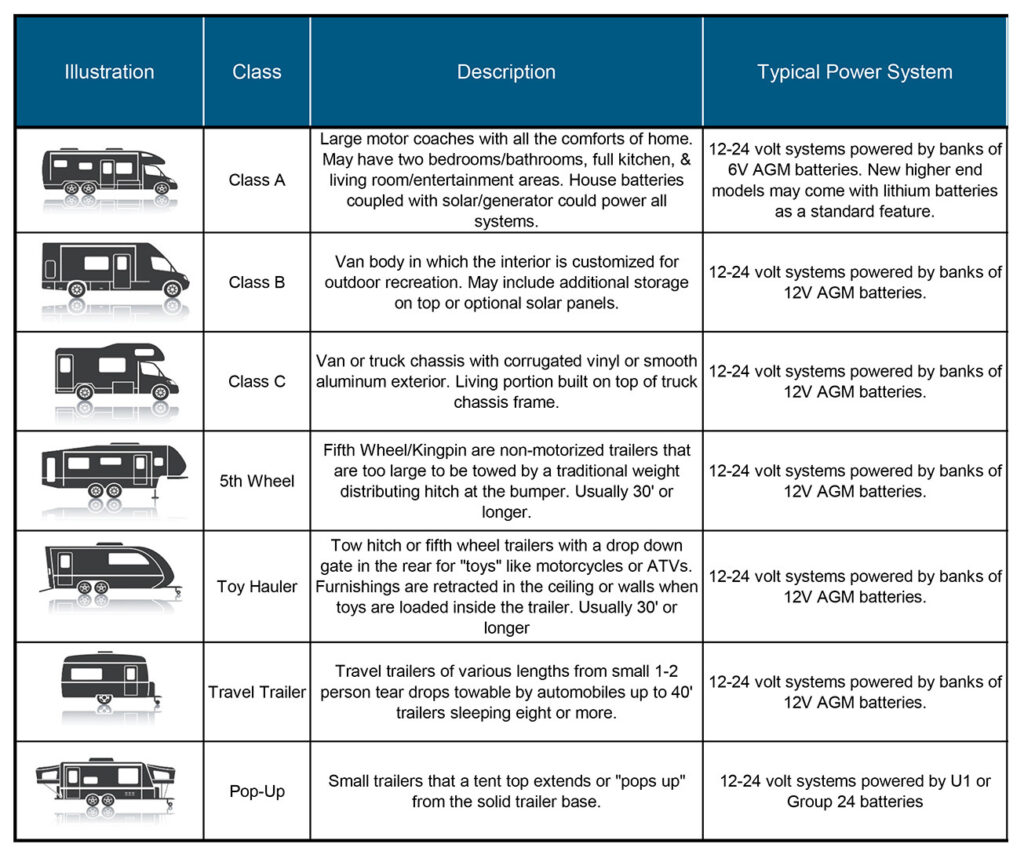RV Caravan Battery
Auxiliary power for Recreational Vehicle or motorhome/campervan backup battery.
When your journey involves countless miles or remote campsites, you need a trustworthy battery that won’t hold you back.
Lithium Benefits for RV
RV Lithium Batteries are rechargeable batteries that have become a popular replacement for lead-acid batteries. They are based on a newer, more efficient lithium-ion technology known as LiFePO4 or lithium iron phosphate. It’s hard to beat a lithium iron phosphate (LiFePO4) battery when they deliver everything you need to support life on the road and off-the-grid. Inherently safe and lightweight, you’ll not only travel further more efficiently you’ll do it with less of a footprint without sacrificing power, performance and reliability.
Flooded Lead Acid battery
- Lowest cost of entry
- Works great for many people
- Weighs less than AGM
- Mostly temperature-proof
- Outgassing
- Routine maintenance required
- Must fully charged for max life
- Peukert’s law
AGM battery
- Maintenance free
- No outgassing
- Can be installed indoors
- Fewer replacements
- Fewer sulphation issues
- Less temperature sensitive
- Heaviest weight
- Cost more for modest gains
- Peukert’s Law
Lithium-Ion Batteries
- Lithium batteries have up to 15% higher charging efficiency
- Lithium Batteries are up to 50% lighter than AGM batteries
- Lithium Batteries have a longer lifespan
- Deeper depth of discharge
- Maintenance free
- No Peukert’s Law
Benefits of Lithium RV Batteries
There are numerous benefits to using lithium RV batteries. They can handle deeper cycling than lead-acid batteries without suffering damage. The life span of lithium batteries is significantly longer than that of lead-acid batteries. And lithium batteries are lighter in weight and take up less space than traditional lead-acid batteries.
Lithium batteries charge faster than lead-acid batteries.
The fact that lithium batteries recharge faster than lead-acid batteries is a tremendous advantage, particularly for solar applications. Additionally, if you use a generator to recharge your lithium batteries, you’ll have to spend less time (and therefore less fuel) running your generator.
Another huge benefit that’s rarely mentioned is that you don’t need to bring a lithium battery to a full charge every time you charge it. You’ll occasionally want to give your lithium batteries a full charge to help restore their full capacity, but it’s preferable to partially charge a lithium battery the majority of the time, which is ideal for solar applications. AND it helps eliminate the “battery anxiety” that comes with worrying about your lead-acid batteries’ state of charge!
And finally, lithium batteries require no active maintenance. They have a battery management system that monitors their health, while even a sealed lead-acid battery requires careful monitoring of depth of discharge to try to maximize its lifespan.
Recommended Products
Myths About RV Lithium Batteries
“They’re dangerous!”
There was a time when the lithium batteries used in various electronics could overheat and even catch fire. That is no longer the case. As with anything, the technology has advanced, leading to RV lithium batteries made with LiFePO4 (lithium iron phosphate) technology. LiFePO4 utilizes a non-combustible lithium solution.
“They can’t be used in cold weather!”
In fact, you can draw power from an RV lithium battery down to -4 degrees F. As far as charging goes, some lithium batteries are now available with heating elements built-in, so they can be charged even when it’s far below freezing. And because they don’t produce flammable gas while being recharged (which is why flooded lead-acid batteries are installed in vented exterior compartments), you can install lithium batteries inside, where they’re insulated from cold outside temps.
“They’re more expensive!”
Lithium batteries do cost more when initially purchased. It’s also true that they last so much longer than lead-acid batteries, they can be less expensive in the long run. A single lithium battery typically lasts at least ten times longer than its lead-acid counterpart. So, if you intend to keep your rig for a reasonable length of time, the investment will almost certainly pay off.
Commenn models that use as RV Battery
| Battery Voltage | Battery Capacity | Total Energy |
| 12v | 100Ah | 1280WH |
| 12v | 200Ah | 2560WH |
| 24v | 100Ah | 2560WH |
| 24v | 200Ah | 5120WH |
| 48v | 50AH | 2560WH |
| 48V | 100Ah | 5120WH |
| Other model customizeable, battery also can be put in parallel for high capacity | ||
Lithium Valley RV batteries
When you go off grid during long days rolling the open road in your RV, you need to be prepared for all that mother nature can throw at you. Engineered with Lithium Iron Phosphate (LiFePO4) technology this battery has twice the power, half the weight, and lasts 4 times longer than a sealed lead acid battery – providing exceptional lifetime value.
With a lifespan of 3,000 charge cycles this battery will last up to 5 times longer than your typical SLA battery – providing exceptional value over time. Big capacities provides a full day of power for high amp draw trolling motors or for long days on the open road in your RV. Ideal for deep cycle applications like trolling motors, solar energy storage, or marine/boating, where you need lots of power for a long time.
our team of experts are here for you
Our goal is to power your ideal RV experience. We build our batteries to perform better, last longer and provide the deliverable power needed for weekend adventures or full-time boondocking. Our batteries were designed as replacements for the most common lead acid sizes on the market, so you can find the 12 V or 24 V lithium deep cycle battery that works best for you.
Our staff specializes in the technical specifics about lithium batteries and the components to support a lithium upgrade. They can also advise on the install of batteries and equipment.
Welcome customized order
different classes of RVs

FAQ
The lifetime of your RV battery depends on how well you maintain it, how often you utilize it, and what kind of battery you have. Lithium ion batteries may last for as many as 5,000 charge cycles, whereas deep-cycle batteries may only last for 400 or 500.
Your RV coach has two separate battery systems, a 12-volt DC system and a 120-volt AC system. There’s also an automotive 12-volt system for starting the engine and running basic automotive functions, just as there is in your car.
Well, it doesn’t need one… but everything will certainly work a lot more easily if you’ve got batteries on board!
The battery disconnect switch for RV cuts off the electrical power between your batteries and the RV. Flipping the switch helps protect against electrical fires and theft when your RV equipment isn’t being used. It’s also important to shut off the power as a safety measure when you’re doing maintenance. Finally, it protects your RV batteries from excessive drain – even when your appliances are off, they’re still draining your batteries a little bit.
Usually, to install the switch, you run the negative battery cable that comes from the RV to one side of the switch, and then a shorter one from the switch to the battery. When you turn the switch it will disconnect between these two cables, and you won’t have to get out a wrench every time you want that done.
The first thing to know is that there are several battery types. The battery used to start and run the engine is referred to as a chassis battery or a starting battery. You should not use this battery to power your appliances. The battery or batteries – as there can be more – used to supply 12-volts to the RV are called RV house batteries.
The cost of your batteries varies wildly with which kind of battery you get. For instance, a single, 12-volt, regular wet-cell lead acid battery might cost several hundred dollars, while lithium battery setups can cost thousands. That said, lithium batteries’ extended lifespans can mean their cost-effectiveness is actually much better in the long run, so if you can foot the expense upfront, it’s worth it.
Whether or not RV lithium batteries are worth the investment for you really depends on how you intend to use your RV. For RVers who prefer the luxuries of an RV park and who are generally hooked up to shore power, chances are lithium batteries won’t pay off for you. But for those of us who prefer to camp off the grid as much as possible, lithium batteries will pay off over time, both in terms of dollars, and in user satisfaction.
To install an RV battery, start by turning off all of the objects that draw power from the battery, including minor appliances like overhead lights. Make a note of where the current battery is located, and then disconnect the cables — negative first, then positive. Clean the cables and the new battery’s terminals if necessary, and then insert the battery and reattach the cables. Install any hold-down hardware that accompanies the battery, and then give it a test run!
What People Say About Us
Client Testimonials



Ask Us Anything. anytime.
Email: [email protected]
Tel: +86 15957165590
